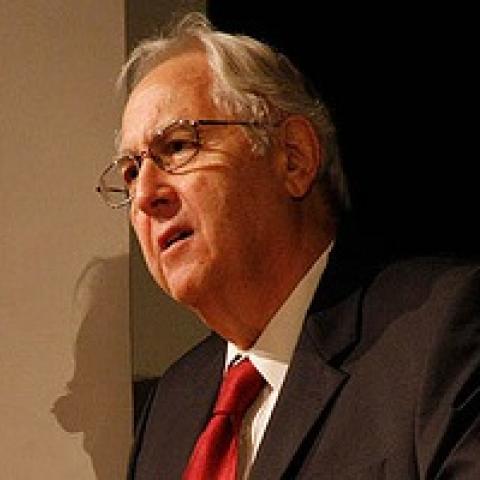Those worried that a new campaign is emerging to get Americans to question whether it's right to support to Israel should be concerned about the new spate of anti-Israel books and arguments.
The publication of John B. Judis’ new book, Genesis: Truman, American Jews, and the Origins of the Arab/Israeli Conflict, must be viewed within the context of the new worldwide effort to question the legitimacy of Israel. It is a counterpart to the 2008 book by John Mearsheimer and Stephen Walt, The Israel Lobby and U.S. Foreign Policy, and perhaps not accidentally shares the same publisher, Farrar, Straus and Giroux.
It also appears at the same time that the left-wing Nation Books published the virulently anti-Israel screed by journalist Max Blumenthal, a man who compares Israel to Nazi Germany. Despite its extremist views and ultra-polemical tone, Blumenthal presented his book in Washington, DC, to the center/liberal think tank the New America Foundation, and received endorsements from prominent journalists Peter Bergen and James Fallows. One should not doubt that similar US institutions will sponsor and give their endorsement to the politically connected Judis, who is a senior editor of the once pro-Israel publication, The New Republic.
Unlike these two other books, Judis offers the pretense that he writes as a historian, and not as a contemporary journalist. The reality is that he uses history to bolster his belief that US foreign policy in the Middle East should now tilt toward the Arabs and Palestinians rather than Israel. After all, he claims in a New Republic essay summarizing the book’s thesis, Israel itself was created “against the opposition of its neighbors” and always had to play a “destabilizing” role in the region, and hence is a “threat to America’s standing in the region.”
Not Iran, that Judis writes is a serious negotiating partner for the United States, nor Syria, or any other Arab state – but only Israel, an ally of the United States surrounded by enemies, stands alone for Judis as a threat.
The truth is that John Judis is anything but a historian. Those of us who labor in that profession – as does this writer – seek to explore the past in order to unearth the truth, and to understand what happened within the context of the period. That is not what Judis does in his book. Rather, Judis is an example of the kind of “historian” who uses history to “prove” a preconceived viewpoint.
Indeed, toward the end of his book, he makes it clear his purpose in writing it is to help create a new American foreign policy, one that will not be beholden to that supposedly all-powerful Zionist lobby in the United States, AIPAC. “If America has tilted in the past toward Zionism and Israel,” he writes, “it is now time to redress that moral balance.”
Judis’ argument is hardly original. He has resurrected the old Arab and anti-Israel narrative from various sources, and dipped into Zionist history to prove his thesis that Zionism’s very goal was to “screw the Arabs,” as he so crudely puts it. Indeed, throughout the book, Judis argues that Zionism’s very purpose was not to find a homeland for Europe’s oppressed Jews, but that it was created with the intention of building a “settler-colonialist” movement whose aim was “to conquer and not merely live in Palestine.” This old paradigm, which has been used by Arab opponents of Israel for generations, is, as Leon Wieseltier, Judis’ colleague at the New Republic writes, “the foul fiction of delegitimation, the old vocabulary of anti-Israel propaganda.”
In his recent review of the book in The Wall Street Journal, Jordan Chandler Hirsch points out that Judis “equates Europe’s mightiest powers with its greatest victims, the Jews – a stateless people seeking refuge in their ancient home by legitimately purchasing and cultivating land.”
Moreover, Judis displays a double standard. Most often, Judis treats Arab actions such as the massacre of Jews at Hebron in 1929, or the invasion by five Arab nations of the new Jewish State of Israel in 1948, as a justified Arab response to Jewish provocation.
Even the Balfour Declaration of 1917 is called by Judis “an attempt by the Jews to screw the Arabs out of a country” that he writes “should have been theirs.”
The second half of Judis’ book is devoted to his thesis that the reason President Harry S. Truman recognized Israel is not because of Truman’s Christian Zionism – which he disputes – or his belief that the Yishuv had a legitimate claim to the land, but because of the overwhelming power and pressure of the American Zionist lobby. As Judis sees it, Hirsch writes, Truman’s deliberations are turned “into a simplistic tale of Jewish bullying.”
His villain is the Zionist rabbi in the United States, Abba Hillel Silver, “who tried to use the Jewish vote and Jewish contributions” against any Democrat who did not support the creation of the State of Israel.
Judis overlooks the fact that at the time the majority of Americans in general and American Jews in particular supported the creation of Israel. Lobbying by the American public, a normal role in a democracy, is transformed by Judis into a sinister Zionist attempt to produce results not in the American national interest.
Those who are rightfully worried that a new campaign is emerging to get Americans to question whether it is right for the American people to give their support to Israel – something that polls show is still an overwhelming sentiment – should be concerned about the new spate of anti-Israel books and arguments. Among this group, John Judis’ Genesis is perhaps one of the most insidious and dishonest.















